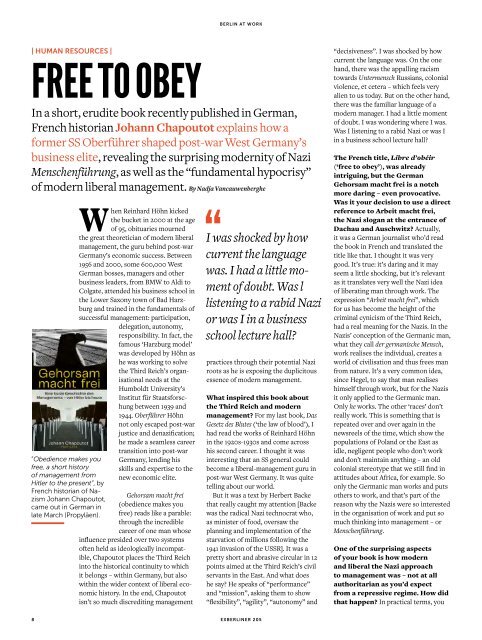EXB-205_Web
From test-driving delivery gigs to scoring work with corona and delving into the Nazi history of modern management, it’s all in a day’s work for Exberliner. Our latest issue explores jobs and jobbing in the city. FREE TO OBEY – A historian explains how an SS Oberführer shaped modern management THE CORONA GIG – A new job market grows out of testing and vaccinating – but how long will it last? COVID CAREER SHIFTS – Four hustlers find themselves at a professional crossroads SECURE IN THE SADDLE – Exberliner takes delivery app employers on a test drive “I’M A RIDER MYSELF!” – Gorillas start-up founder Kağan Sümer on how it all began COWORKING GOES CORPORATE – How big brands are warming to the idea of sharing an office THE HOMEOFFICE DEBATE – As the novelty wears off, we hear four different takes on working from home POLITICAL NOTEBOOK – Business as usual with Israel BEST OF BERLIN – A fashion Plattenbau, wine in a can and home-cooked grub to order BOOKS – The absurdity of Heimat, East German diaries and paperback picks BERLIN BITES – Four puffy-crusted gems of the pizza-demic SHORT ESCAPES – Venturing out to the sandy shores of the Müritz
From test-driving delivery gigs to scoring work with corona and delving into the Nazi history of modern management, it’s all in a day’s work for Exberliner. Our latest issue explores jobs and jobbing in the city.
FREE TO OBEY – A historian explains how an SS Oberführer shaped modern management
THE CORONA GIG – A new job market grows out of testing and vaccinating – but how long will it last?
COVID CAREER SHIFTS – Four hustlers find themselves at a professional crossroads
SECURE IN THE SADDLE – Exberliner takes delivery app employers on a test drive
“I’M A RIDER MYSELF!” – Gorillas start-up founder Kağan Sümer on how it all began
COWORKING GOES CORPORATE – How big brands are warming to the idea of sharing an office
THE HOMEOFFICE DEBATE – As the novelty wears off, we hear four different takes on working from home
POLITICAL NOTEBOOK – Business as usual with Israel
BEST OF BERLIN – A fashion Plattenbau, wine in a can and home-cooked grub to order
BOOKS – The absurdity of Heimat, East German diaries and paperback picks
BERLIN BITES – Four puffy-crusted gems of the pizza-demic
SHORT ESCAPES – Venturing out to the sandy shores of the Müritz
You also want an ePaper? Increase the reach of your titles
YUMPU automatically turns print PDFs into web optimized ePapers that Google loves.
BERLIN AT WORK<br />
| HUMAN RESOURCES |<br />
FREE TO OBEY<br />
In a short, erudite book recently published in German,<br />
French historian Johann Chapoutot explains how a<br />
former SS Oberführer shaped post-war West Germany’s<br />
business elite, revealing the surprising modernity of Nazi<br />
Menschenführung, as well as the “fundamental hypocrisy”<br />
of modern liberal management. By Nadja Vancauwenberghe<br />
“Obedience makes you<br />
free, a short history<br />
of management from<br />
Hitler to the present”, by<br />
French historian of Nazism<br />
Johann Chapoutot,<br />
came out in German in<br />
late March (Propyläen).<br />
When Reinhard Höhn kicked<br />
the bucket in 2000 at the age<br />
of 95, obituaries mourned<br />
the great theoretician of modern liberal<br />
management, the guru behind post-war<br />
Germany’s economic success. Between<br />
1956 and 2000, some 600,000 West<br />
German bosses, managers and other<br />
business leaders, from BMW to Aldi to<br />
Colgate, attended his business school in<br />
the Lower Saxony town of Bad Harzburg<br />
and trained in the fundamentals of<br />
successful management: participation,<br />
delegation, autonomy,<br />
responsibility. In fact, the<br />
famous ‘Harzburg model’<br />
was developed by Höhn as<br />
he was working to solve<br />
the Third Reich’s organisational<br />
needs at the<br />
Humboldt University’s<br />
Institut für Staatsforschung<br />
between 1939 and<br />
1944. Oberführer Höhn<br />
not only escaped post-war<br />
justice and denazification;<br />
he made a seamless career<br />
transition into post-war<br />
Germany, lending his<br />
skills and expertise to the<br />
new economic elite.<br />
Gehorsam macht frei<br />
(obedience makes you<br />
free) reads like a parable:<br />
through the incredible<br />
career of one man whose<br />
influence presided over two systems<br />
often held as ideologically incompatible,<br />
Chapoutot places the Third Reich<br />
into the historical continuity to which<br />
it belongs – within Germany, but also<br />
within the wider context of liberal economic<br />
history. In the end, Chapoutot<br />
isn’t so much discrediting management<br />
I was shocked by how<br />
current the language<br />
was. I had a little moment<br />
of doubt. Was l<br />
listening to a rabid Nazi<br />
or was I in a business<br />
school lecture hall?<br />
practices through their potential Nazi<br />
roots as he is exposing the duplicitous<br />
essence of modern management.<br />
What inspired this book about<br />
the Third Reich and modern<br />
management? For my last book, Das<br />
Gesetz des Blutes (‘the law of blood’), I<br />
had read the works of Reinhard Höhn<br />
in the 1920s-1930s and come across<br />
his second career. I thought it was<br />
interesting that an SS general could<br />
become a liberal-management guru in<br />
post-war West Germany. It was quite<br />
telling about our world.<br />
But it was a text by Herbert Backe<br />
that really caught my attention [Backe<br />
was the radical Nazi technocrat who,<br />
as minister of food, oversaw the<br />
planning and implementation of the<br />
starvation of millions following the<br />
1941 invasion of the USSR]. It was a<br />
pretty short and abrasive circular in 12<br />
points aimed at the Third Reich’s civil<br />
servants in the East. And what does<br />
he say? He speaks of “performance”<br />
and “mission”, asking them to show<br />
“flexibility”, “agility”, “autonomy” and<br />
“decisiveness”. I was shocked by how<br />
current the language was. On the one<br />
hand, there was the appalling racism<br />
towards Untermensch Russians, colonial<br />
violence, et cetera – which feels very<br />
alien to us today. But on the other hand,<br />
there was the familiar language of a<br />
modern manager. I had a little moment<br />
of doubt. I was wondering where I was.<br />
Was I listening to a rabid Nazi or was I<br />
in a business school lecture hall?<br />
The French title, Libre d’obéir<br />
(‘free to obey’), was already<br />
intriguing, but the German<br />
Gehorsam macht frei is a notch<br />
more daring – even provocative.<br />
Was it your decision to use a direct<br />
reference to Arbeit macht frei,<br />
the Nazi slogan at the entrance of<br />
Dachau and Auschwitz? Actually,<br />
it was a German journalist who’d read<br />
the book in French and translated the<br />
title like that. I thought it was very<br />
good. It’s true: it’s daring and it may<br />
seem a little shocking, but it’s relevant<br />
as it translates very well the Nazi idea<br />
of liberating man through work. The<br />
expression “Arbeit macht frei”, which<br />
for us has become the height of the<br />
criminal cynicism of the Third Reich,<br />
had a real meaning for the Nazis. In the<br />
Nazis’ conception of the Germanic man,<br />
what they call der germanische Mensch,<br />
work realises the individual, creates a<br />
world of civilisation and thus frees man<br />
from nature. It’s a very common idea,<br />
since Hegel, to say that man realises<br />
himself through work, but for the Nazis<br />
it only applied to the Germanic man.<br />
Only he works. The other ‘races’ don’t<br />
really work. This is something that is<br />
repeated over and over again in the<br />
newsreels of the time, which show the<br />
populations of Poland or the East as<br />
idle, negligent people who don’t work<br />
and don’t maintain anything – an old<br />
colonial stereotype that we still find in<br />
attitudes about Africa, for example. So<br />
only the Germanic man works and puts<br />
others to work, and that’s part of the<br />
reason why the Nazis were so interested<br />
in the organisation of work and put so<br />
much thinking into management – or<br />
Menschenführung.<br />
One of the surprising aspects<br />
of your book is how modern<br />
and liberal the Nazi approach<br />
to management was – not at all<br />
authoritarian as you’d expect<br />
from a repressive regime. How did<br />
that happen? In practical terms, you<br />
8<br />
<strong>EXB</strong>ERLINER <strong>205</strong>


















